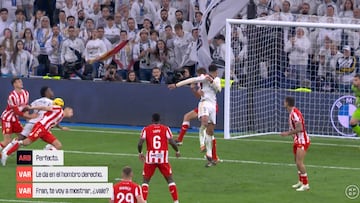Real Madrid - Almería VAR controversy: “The referee was shown wrong images for Vinícius’ goal”
TV director Jaume Roures says footage from the correct angle shows the Brazilian “clearly” scored with his arm, not his shoulder.

Referee Francisco José Hernández Maeso and VAR Alejandro Hernández Hernández were at the centre of plenty of controversy during Real Madrid’s comeback 3-2 win over Almería in LaLiga on Sunday. The pair combined to overturn a number of on-field decisions, with a penalty given against visiting defender Kaiky Fernandes for handball, Sergio Arribas’ goal disallowed for a foul by Dion Lopy on Jude Bellingham and Vinícius Júnior’s equaliser allowed to stand after it had initially been ruled out for handball.
The revelation of the images that on-field Hernández Maeso was shown, in addition to the audios of his conversation with the Video Operation Room, where the VAR team is located, have raised even more eyebrows.
Different angle shows “clear” Vinícius handball
Speaking to Spanish radio station Cadena SER, Jaume Roures, the founder of Mediapro, the company who supply VAR images for the Spanish Soccer Federation (not LaLiga), revealed how images of incidents are selected. And he says Hernández Maeso wasn’t provided with the necessary footage to make the correct decision on whether Vinícius’ goal should have been awarded.
Jaume Roures, founder of Mediapro, talks about the VAR controversy
— 𝗖𝘂𝗹𝗲𝗿𝘀 𝗚𝗿𝗮𝘀𝘀𝗿𝗼𝗼𝘁 (@culersgrassroot) January 22, 2024
🗣️ “The VAR images of Vinicius' goal were bad shots. The repetition from a frontal shot makes it clear that he put it with his arm.”
[Via @La_SER ] pic.twitter.com/nDfh9NhoWJ
“What I want to emphasise is that the referee wasn’t shown the right images of Vinícius’ goal, the ones that show there’s no doubt it hit his arm. The replay from directly behind the goal clearly shows he put it in with his arm,” Roures claimed. “I don’t want to get involved with the other incidents because this one already seems like the key one to me. The others might be more debatable, like the foul on Bellingham, or the player’s hand being raised...”
What images does the VAR see?
Related stories
Roures also explained which images are sent to the VAR so they can review on-field incidents. “The images from all the cameras are sent. In a Real Madrid match, there must be around twenty-something cameras. Then, the VAR, the operators seen on the screen and the referees decide how to use them. All signals are sent live. There is no editing. The cameras capture the images and those are the images that reach the VAR,” he explained.
Keep up to date with all the latest soccer news on AS USA.

